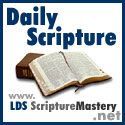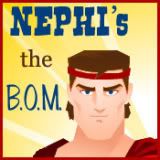Questions can be powerful! They can help us to see, feel, think, and do things differently. In fact, I have found that one of the most effective ways to change your life is to simply change the questions you ask yourself, your friends, and the Lord.
I love questions! I love their ability to help us focus, to see things we've never seen before. The right questions can help us to understand things we've never understood, to think things we've never thought, and to have the courage to do things we've never had the courage to do. But not all questions are created equal. The kinds of questions you ask can either help you change your life for the better or ensure that you stay firmly stuck in a rut.
Let's consider the troublemaking question that begins, "Why am I so . . . ?" and ends with any number of self-demoralizing or sabotaging words or phrases. Most of us don't need much help writing a negative kind of question, do we?
Ask yourself, Is there a troublemaking question in my life that sneaks up on me and begins with "Why am I so . . . ?" Now, think about the influence that question is having on you, your life, and your relationships. Are you ready for some change?
Consider some alternative questions that can actually free your mind and heart and get you moving forward with your life. Focus on that same troublesome situation and ask yourself, How is that situation a problem for me? Answers to these questions help uncover the real problem. Go ahead - apply them to your situation. Can you feel some of your irritation, sadness, and frustration falling away? Same situation. Different questions. Different results.
The Hook
Questions can linger in our hearts and in our minds in very useful ways, all the while inviting us to see things we haven't before. Have you ever noticed that question marks are shaped like hooks? That's because questions come with that little hook at the end; they hook thoughts and feelings and possible actions. One question can pull all of that into your heart and mind. That's a pretty powerful hook! And those thoughts, feelings, and actions that are drawn out work either for us or against us.
How can we use the connection between questions we ask and the resulting thoughts, feelings, and actions for our good? How can we change our questions, and therefore change how we think and feel about a situation, and therefore change what we can do?
Let's start by talking about solution-seeking questions. What kinds of questions can help you find solutions? Think about a difficult situation you are presently in. It's been tough slogging for a really long time - longer than you ever imagined. You continually try to make the situation better, and nothing seems to change. You feel discouraged. What happens to your mind and your heart when you "try on" the following question: "What can I do to learn from this difficult experience?"
This question can be extremely useful as we continue to discover that our timing is not the Lord's timing. When we wish that something would end, and yet it doesn't, asking this question can help us continue to put one faith-filled footstep in front of the other. To see some things we haven't seen. To be encouraged to try some new things so we can learn what there is to learn. To pray to know what the lessons are.
Three Kinds of Questions
Now and then, we realize we've become disconnected from life - from the people and activities that are important to us - and we may not know why. Questions can be a great way to reconnect and move forward with these relationships. Specifically, there are three kinds of questions that can increase our ability to see things previously unseen. These kinds of questions can change our conversations with others, dramatically change our understanding of others, and even change their understanding of themselves. These questions can gather information and introduce information simultaneously. That's what makes them so effective.
Difference Questions
Difference questions are based upon the idea that difference is information. For example, we know that something is cold because something else is hot. These kinds of questions explore differences between people, relationships, and situations. They use words such as "most," "least," "best," or "worst." Let's consider an example.
To a daughter whose father has just been diagnosed with Alzheimer's disease, a helpful difference question might be, "Are you more concerned about your mom or your dad since your father was diagnosed with Alzheimer's?" Now, that question might not just gather information, it may also introduce new information. The question might help the daughter think about something she hasn't yet considered. For example, with all the upheaval surrounding her father's diagnosis, the daughter may have been so focused on her father that she may have forgotten entirely about what might be happening with her mother as a result of the diagnosis. Can you see how asking just one question can trigger some great thinking and conversations?
Behavioral Effect Questions
Just as the name suggests, behavioral effect questions explore the effect of one's behavior on thoughts and feelings and other behaviors. To a friend whose son has not been coming home on time, you may want to ask, "When your son comes home late, what thoughts do you have?" This simple question can invite your friend to explore the effect her son's behavior has on her thoughts. For example, does she tell herself that she is a bad mother? What fears arise in her mind? All of that can be explored by having her respond to just one question.
A behavioral effect question can also be posed to explore the effect of someone's behavior on his or her own thoughts, feelings, and actions. For example, here are some behavioral effect questions that might be asked of a person who is stuck in a vicious cycle of irresponsible eating and weight gain: "When you find yourself eating in a manner that guarantees you will gain weight, just after you have a made a pledge to eat healthily, what do you tell yourself? How do you feel? What do you do then?"
What If Questions
The what if question invites exploration of possibilities, alternative actions, or meanings. It invites us to think of things that haven't happened yet, but could.
Let's consider an example. To a woman whose husband has lost his job, a what if question might be: "If your husband were to find a job tomorrow, is there anything about the situation that would concern you?" This is an unexpected question, as most women would be happy to have their husbands find new employment. But perhaps there are some things - about the new job or about having her husband away after enjoying him being home - that would be useful for this woman to think about and acknowledge.
What if questions can be useful to invite people to think of alternative outcomes of a situation. Also, when someone is so certain that a particular action means one thing, helping them to consider another view of the situation can open their mind to another possible meaning for the very same behavior and can be helpful. Don't let the what ifs inspire fear - let them enlighten you so that you know how to deal with a potential situation.
More than anything else, I want you to recognize that learning to ask meaningful questions really can change your life. This was never better exemplified than when a young, fourteen-year-old boy accepted the familiar invitation from James - "If any of you lack wisdom, let him ask of God" - and decided to ask God which church he should join. That single question not only changed his life forever but also changed the world. Truly, questions can be powerful agents of change. So go ahead - start asking for change in your life!
---
Wendy L. Watson Nelson holds a PhD in family therapy and gerontology. Prior to her marriage to Elder Russell M. Nelson on April 6, 2006, Wendy had been a professor of marriage and family therapy for twenty-five years. She taught at the University of Calgary in Calgary, Alberta, Canada, and at Brigham Young University. She is the author of several books, including her new book, Change Your Questions, Change Your Life, from which this article is adapted. Now available at Deseret Book. Deseret Book, 2009. Photo by Joanna Margueritte/sxc.hu.
7 hours ago










No comments:
Post a Comment